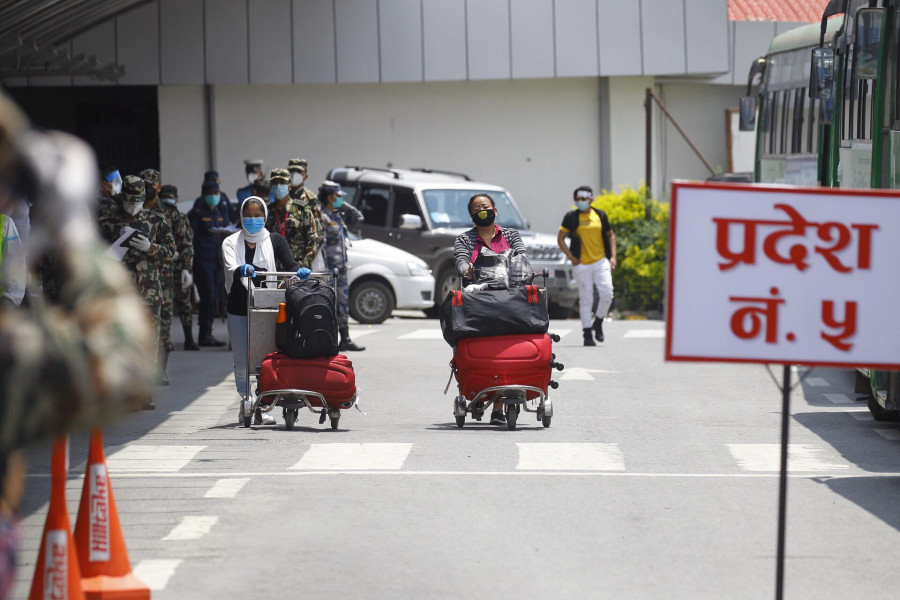National
Only 217 migrant workers availed of pandemic repatriation scheme
Poor implementation of the programme led to low numbers, labour rights experts say.
Chandan Kumar Mandal
Only a small number of Nepali migrant workers who were stranded in various parts of the world due to the Covid-19 lockdowns availed of the government’s pandemic repatriation programme, data of the Foreign Employment Board show.
According to the data, only 217 workers were able to benefit from the programme and return home from various labour destination countries.
“The rescued migrant workers were provided with flight tickets and other support for their safe return home amid the pandemic,” said Din Bandhu Subedi, spokesperson of the board. “The workers facing trouble in various labour destination countries were provided assistance through the Nepali missions in respective countries.”
After tens of thousands of Nepali migrant workers were stranded in various labour destination countries amid the pandemic, the Supreme Court had asked the government to repatriate them at its own expense.
Following the court’s order, the government had introduced a directive on repatriation of stranded workers who had migrated to various countries for jobs after receiving labour permits.
As per the directive, the government could use the foreign employment welfare fund to repatriate the workers.
But the number of workers repatriated under the programme was far fewer than anticipated.
As many as 500,000 workers were expected to return home after losing their jobs due to the pandemic. As of Wednesday, over 356,107 Nepalis, including migrant workers, have returned home on chartered and regular flights. The majority of them returned home at their own expense.
According to the Foreign Employment Board, nearly Rs 24.8 million budget was spent on repatriating Nepali migrant workers. An additional Rs 197,100 was spent on providing financial assistance to other 186 migrant workers who were placed in holding centres upon arrival.
Earlier, the Foreign Employment Board had estimated to support around 10,000 Nepali workers by allocating Rs 750million for their repatriation. But against the estimate, the government could only extend support to only a fraction of workers who returned home after months of struggle for basic needs in foreign countries.
Advocate Shom Prasad Luitel, one of the petitioners who moved the Supreme Court seeking repatriation of stranded Nepali citizens due to the pandemic, said not many people could take advantage of the repatriation programme because the government’s directive was poorly implemented.
“The government agencies, mainly the Nepali missions abroad, did not show any intention of implementing the directive that was aimed at helping the Nepali migrant workers,” said Luitel. “Even the board was hesitant to help the workers from the beginning.”
Due to the long-wait for flights and hassles in accessing the government support, a large number of workers returned home at their own expense. Many had to take loans to fund for expensive chartered flight tickets.
But officials at the Foreign Employment Board claim that it looks like fewer people benefitted from the government’s repatriation programme because many of them returned home on flights, the fare for which were paid by their employers.
“The directive said that employers would be made accountable for paying the airfare of migrant workers. With the initiatives of Nepal-based recruiting agencies and Nepali missions, a large number of workers who had returned during that time had got free tickets from their employers,” said Subedi, the spokesperson of the board.
He added many more workers would have returned on flight tickets paid by their employers had the international flights not been suspended for several months.
As per the repatriation guidelines, only those workers who haven’t received air tickets and other expenses from their host countries, employers, or recruiting agencies to return home would be entitled to financial support from the Nepal government.
The complicated provisions in the repatriation guidelines, which could take a long time in checking the eligibility of workers, had been criticised for only adding hassles to stranded workers who were planning to return home on government support.
Labour rights activists like Luitel say there should not have been any conditions when it comes to helping the citizens languishing in foreigh countries.
“As the board was reluctant to spend the fund on bringing migrant workers home, criteria were defined for providing the support and hence the directive looked rigid,” said Luitel. “The directive could have been amended anytime to help the migrant workers.”




 11.12°C Kathmandu
11.12°C Kathmandu















